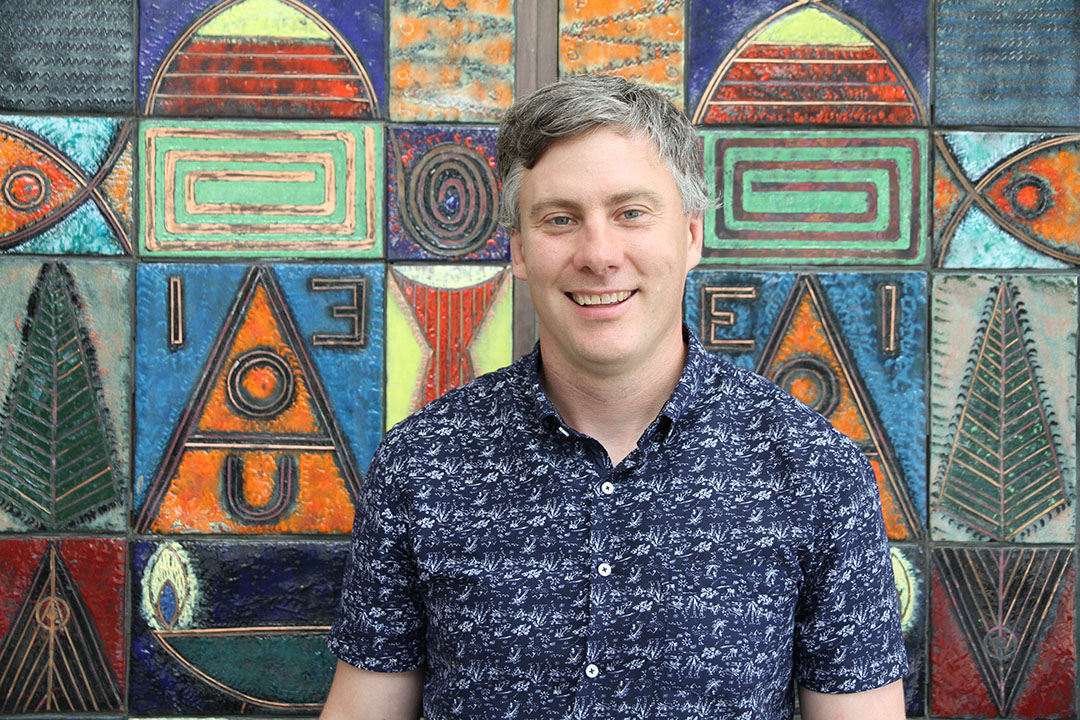
Religion and Sport: Examining redemption and the Roughriders
It didn’t take long for Chris Hrynkow to discover just how passionate people in this province are for their beloved Saskatchewan Roughriders, after he moved here from Winnipeg back in 2011.
By James Shewaga“The first weekend that I moved here was Labour Day weekend and I went to church and the priest was talking in his homily about the Roughriders,” said Hrynkow, an associate professor of religious studies in St. Thomas More College at the University of Saskatchewan.
“(Former Roughrider) Glen Suitor said it’s not just a team, it’s not just a game, it’s a way of life. And if you didn’t know that he was talking about football, you’d think it was a statement about religion.”
Hrynkow explores the similarities and connections between sport and religion, the devotion of fans and fanatics, the expression of religious traditions in sport, and even arguments for considering the Roughriders a religion of sorts, in his Religious Studies 229 class: Religion and Sport, one of the unique courses on campus.
“I’ll tell you why we teach it: In religious studies we study the world’s major religions like Islam, Christianity, Judaism, Buddhism,” he said. “But there is also this idea that other things function like religions, like a civil religion, and this is a perfect example.
“The interesting thing is curling is actually the official sport of Saskatchewan. But if that is the official sport, are the Roughriders the unofficial religion of the province?”
From faith and devotion to suffering and redemption, to making the pilgrimage to Regina’s Mosaic Stadium from all corners of the province to watch games, Hrynkow said there are many parallels between sport and religion, particularly when discussing the dedicated face-painting, jersey-wearing masses who make up “Rider Nation.”
“Something that religion and sport scholarship talks about is looking at sporting venues as cathedrals,” said Hrynkow, who received the St. Thomas More Teaching Excellence Award for the 2017-18 academic year. “If you came here from another country on a game day and you didn’t know where the team was based, you could just follow people from all across the province going down to Regina to watch the game. It’s a pilgrimage for them and it’s like a cathedral for the most ardent fans. It’s a case of total identity and similar to religious services.”
So what powers the passion that makes Rider fans unique? While the CFL club has won two of the last 11 Grey Cups and now out-sells all other teams in the league combined in merchandising, it wasn’t always that way. Much like the boom-or-bust economic history of the province, the team has also suffered through lean years, winning only one Grey Cup in its first 65 years and missing the playoffs every year from 1977 to 1987.
The rallying cry of “Rider Pride” was coined during a 1979 fundraising campaign, with province-wide telethons also held in the 1980s and 1990s to keep the team afloat. Hrynkow said it’s that passionate community connection that has kept the team alive, with the Roughriders one of the last community-owned professional franchises in North America, operating in the second-smallest major pro sports market.
“They had to have telethons just to save the team and that is very similar to religious fundraising and the idea that you phone in and testify and give your money,” he said. “People who are outsiders, they don’t understand why this is so important. But it’s about identity and total commitment and faith in your community and faith in your team. It’s about everything you want Saskatchewan to be.”
Hrynkow said it is during those tough times, for both the team and the province, that the fans’ faith is tested—and later rewarded—another parallel between religion and the Riders.
“It’s a problematic part of that Christian background in particular, that idea that suffering is worth it because it will pay off in the end,” he said. “When it comes to Rider fans, all that suffering in the losing seasons is worth it because of what they stand for. The people don’t give up and they have faith that it will eventually pay off. It pushes it to the spiritual and religious end of the spectrum.”
And a Rider fan is a fan for life—and beyond, apparently.
“There is a funeral home in Regina, and they have a whole package where you get buried in a Riders jersey with the full Riders treatment,” said Hrynkow. “So, for some people, religion and sport serve as a total identity.”
Which brings us back to that first church service Hrynkow attended years ago, when the priest preached about the Roughriders, rather than the resurrection.
“That is the really interesting thing because there are a lot of religious leaders, ministers and priests, who are huge Rider fans, too,” he said. “There are a couple of groups of nuns in Saskatchewan who are super committed Rider fans and they say things like ‘we pray for the Riders to win’ and I am certain that they are very dedicated religious sisters as well. But on game day, they are all about the Riders.”

